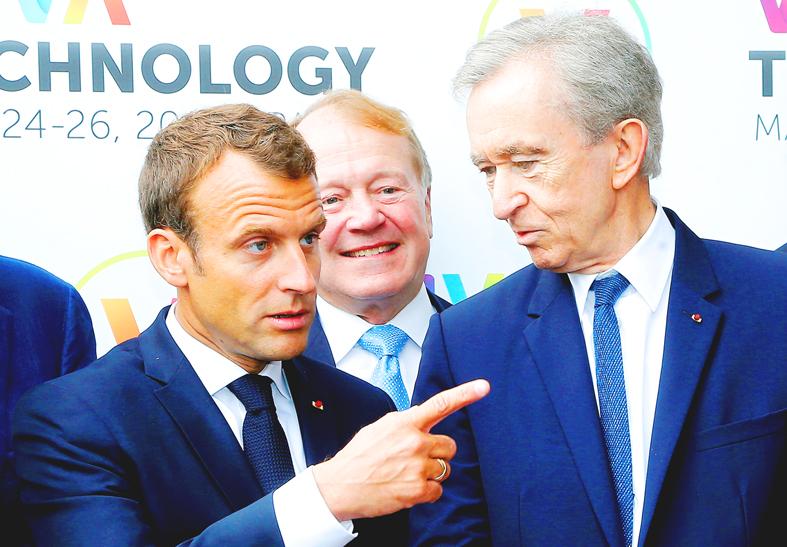The holiday blessing that Tiffany & Co shareholders gave to sell the storied jeweler to LVMH Moet Hennessy Louis Vuitton SE pushes the contentious transaction closer to the finish line, giving LVMH chairman and CEO Bernard Arnault the long-sought pathway to expand his global collection of luxury brands.
Tiffany would be dropped from the Standard & Poor’s 500 Index now that the deal has been approved, S&P Dow Jones Indices said late on Wednesday in New York City, with the jeweler replaced by Enphase Energy Inc.
More than 99 percent of the votes cast at a virtual Tiffany shareholder meeting supported the deal, CNBC reported.

Photo: Reuters
The transaction, valued at almost US$16 billion, is expected to close early this year.
The vote was a key step in the year-long saga over the luxury industry’s biggest takeover.
LVMH had agreed to buy the iconic jeweler before trying to back out of the deal when the COVID-19 pandemic upended the retail world.
That prompted a lawsuit by Tiffany and some harsh words from both sides, and the companies eventually agreed to see the deal through at a slightly reduced price.
The two companies in October last year announced that they had reached an agreement, whereby LVMH would buy Tiffany for US$131.50 per share, down from US$135 originally promised.
Tiffany shares were little changed at US$131.35 on Wednesday in New York and are down about 1.7 percent in a tumultuous year for any retailer — let alone one trying to keep a merger intact.
Tiffany had accused LVMH of having “unclean hands” when it initially abandoned the deal.
LVMH in turn disparaged Tiffany for mismanagement of the business during the pandemic, while spending unwisely on dividends.

Nvidia Corp CEO Jensen Huang (黃仁勳) today announced that his company has selected "Beitou Shilin" in Taipei for its new Taiwan office, called Nvidia Constellation, putting an end to months of speculation. Industry sources have said that the tech giant has been eyeing the Beitou Shilin Science Park as the site of its new overseas headquarters, and speculated that the new headquarters would be built on two plots of land designated as "T17" and "T18," which span 3.89 hectares in the park. "I think it's time for us to reveal one of the largest products we've ever built," Huang said near the

China yesterday announced anti-dumping duties as high as 74.9 percent on imports of polyoxymethylene (POM) copolymers, a type of engineering plastic, from Taiwan, the US, the EU and Japan. The Chinese Ministry of Commerce’s findings conclude a probe launched in May last year, shortly after the US sharply increased tariffs on Chinese electric vehicles, computer chips and other imports. POM copolymers can partially replace metals such as copper and zinc, and have various applications, including in auto parts, electronics and medical equipment, the Chinese ministry has said. In January, it said initial investigations had determined that dumping was taking place, and implemented preliminary

Intel Corp yesterday reinforced its determination to strengthen its partnerships with Taiwan’s ecosystem partners including original-electronic-manufacturing (OEM) companies such as Hon Hai Precision Industry Co (鴻海精密) and chipmaker United Microelectronics Corp (UMC, 聯電). “Tonight marks a new beginning. We renew our new partnership with Taiwan ecosystem,” Intel new chief executive officer Tan Lip-bu (陳立武) said at a dinner with representatives from the company’s local partners, celebrating the 40th anniversary of the US chip giant’s presence in Taiwan. Tan took the reins at Intel six weeks ago aiming to reform the chipmaker and revive its past glory. This is the first time Tan

CUSTOMERS’ BURDEN: TSMC already has operations in the US and is a foundry, so any tariff increase would mostly affect US customers, not the company, the minister said Taiwanese manufacturers are “not afraid” of US tariffs, but are concerned about being affected more heavily than regional economic competitors Japan and South Korea, Minister of Economic Affairs J.W. Kuo (郭智輝) said. “Taiwan has many advantages that other countries do not have, the most notable of which is its semiconductor ecosystem,” Kuo said. The US “must rely on Taiwan” to boost its microchip manufacturing capacities, Kuo said in an interview ahead of his one-year anniversary in office tomorrow. Taiwan has submitted a position paper under Section 232 of the US Trade Expansion Act to explain the “complementary relationship” between Taiwan and the US